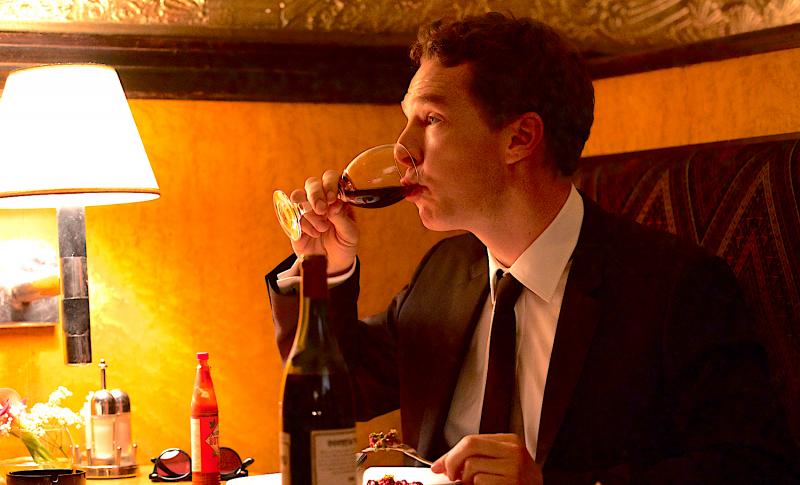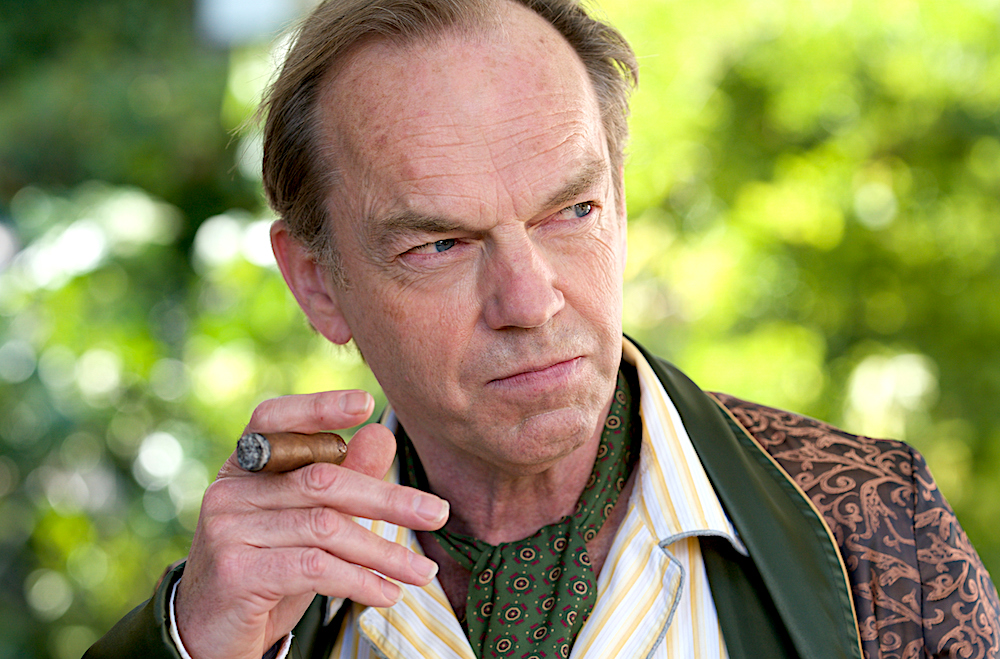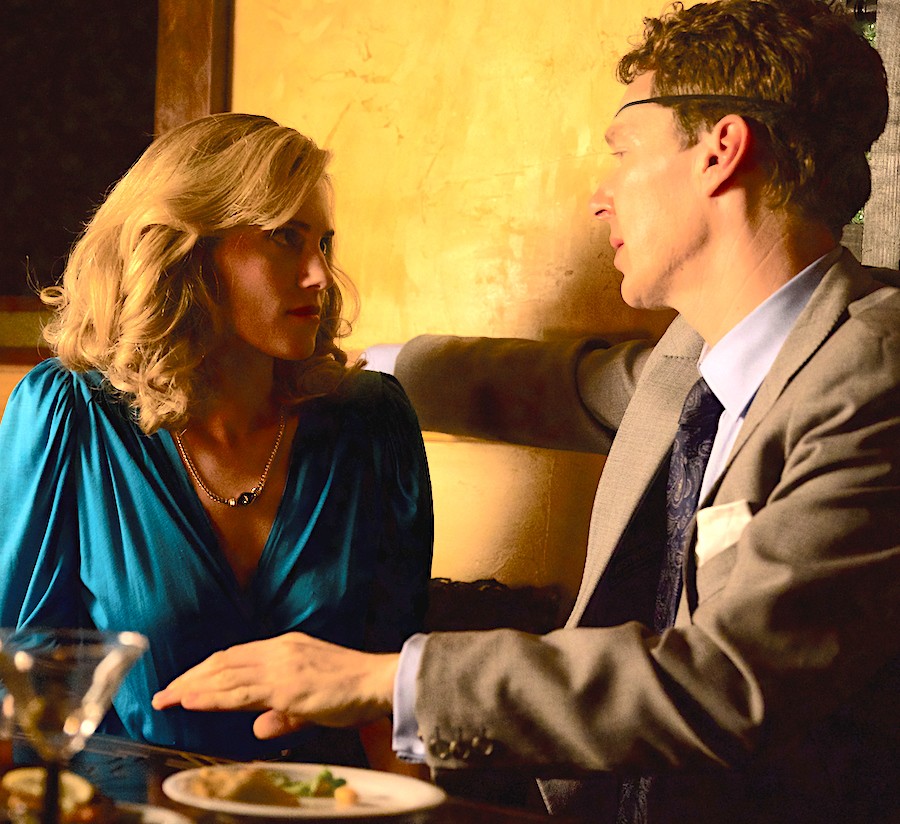Patrick Melrose, Sky Atlantic review - an olympiad of substance abuse | reviews, news & interviews
Patrick Melrose, Sky Atlantic review - an olympiad of substance abuse
Patrick Melrose, Sky Atlantic review - an olympiad of substance abuse
Edward St Aubyn's drug-addled toff meets the cult of Cumberbatch

Edward St Aubyn’s Patrick Melrose novels have been admired for their prose style, scathing wit and pitiless depiction of a rotting aristocracy.
Each of the five-part series will dramatise one of St Aubyn’s books. This opener, Bad News (actually the second book in the series) found our drug-addled, psychologically shattered and disdainfully posh anti-hero taking a trip to New York to bring back the ashes of his recently-deceased father. Patrick’s ambivalent (to put it mildly) feelings about his father’s death were telegraphed straight away. As he heard the news down the phone, he seemed to be struck dumb with grief, but in fact he was merely virtually comatose on heroin and fumbling for a syringe. He did manage a wry smile, though. He seized upon the New York trip as a chance to turn a page in his life, kick his many-headed drug habit and start over. He reckoned it would be easy – after all, he’d done it before. One of his girlfriends, Julia (Jessica Raine), wasn’t convinced. “Addicts don’t give up until they hit rock bottom,” she advised sagely, “and you never will.”
He seized upon the New York trip as a chance to turn a page in his life, kick his many-headed drug habit and start over. He reckoned it would be easy – after all, he’d done it before. One of his girlfriends, Julia (Jessica Raine), wasn’t convinced. “Addicts don’t give up until they hit rock bottom,” she advised sagely, “and you never will.”
Inevitably the trip – to a supposedly 1980s New York rather too obviously botched together from generic location shots and studio setups – turned into an olympiad of substance abuse, as Melrose dosed himself up for the ride on Concorde, went cold turkey in a taxi, suffered cramps and paranoia, then tracked down some drug dealers in Central Park to ease his pain with quaaludes and speed. As his agenda progressed, cocaine, heroin and gallons of alcohol were stirred recklessly into the toxic morass of his body, as he almost got knifed and shared dirty needles with some amusing low-life characters.
It’s all quite entertaining, but while there’s black comedy and plenty of dry asides in Cumberbatch’s performance, the character’s inner pit of pain and terror gets blotted out by the display of thespian fireworks. There were flashbacks depicting Patrick’s childhood in which he was terrorised and traumatised by his father David, who’s played with coiled, supercilious sadism by Hugo Weaving (pictured above), but the idea that childhood + abuse = Patrick the junkie was hammered home as though ticking boxes, like a subtext bulletin board.
 The biggest snag is that you can't avoid noticing that Cumberbatch is acting for all he’s worth and delivering A Performance, though whether he was really the man for the job is a moot point. As he revealed last week in a magazine interview worthy of an Oscar for sycophancy, he’s a non-drinking, non-smoking vegan who practises yoga, and while of course an actor worth his salt must be able to step outside his comfort zone, Cumberbatch as junkie is a tough sell. It’s as if they cast Jacob Rees-Mogg to play Keith Richards. Cumberbatch is too controlled and self-aware, too sleek and impeccably tailored, and instead of being strung out and stubbly he’s smoothly shaved as though he’s in a Gillette commercial. The scene where he mimed passing out from tranquillisers in an expensive New York hotel, dragging himself across the floor in slow motion, was more Benny Hill than Hunter S Thompson. When Marianne, another female acquaintaince, described him as "a self-indulgent little shit," she wasn't wrong (pictured above, Cumberbatch with Allison Willams as Marianne).
The biggest snag is that you can't avoid noticing that Cumberbatch is acting for all he’s worth and delivering A Performance, though whether he was really the man for the job is a moot point. As he revealed last week in a magazine interview worthy of an Oscar for sycophancy, he’s a non-drinking, non-smoking vegan who practises yoga, and while of course an actor worth his salt must be able to step outside his comfort zone, Cumberbatch as junkie is a tough sell. It’s as if they cast Jacob Rees-Mogg to play Keith Richards. Cumberbatch is too controlled and self-aware, too sleek and impeccably tailored, and instead of being strung out and stubbly he’s smoothly shaved as though he’s in a Gillette commercial. The scene where he mimed passing out from tranquillisers in an expensive New York hotel, dragging himself across the floor in slow motion, was more Benny Hill than Hunter S Thompson. When Marianne, another female acquaintaince, described him as "a self-indulgent little shit," she wasn't wrong (pictured above, Cumberbatch with Allison Willams as Marianne).
Other aspects of St Aubyn’s saga will doubtless come to the fore in future episodes, especially Patrick’s history with his father and his mother Eleanor (Jennifer Jason Leigh, barely glimpsed in this episode). But it brought on disturbing flashbacks of BBC’s 2010 adaptation of Martin Amis’s Money, a tale of lurid materialistic excess and savage wit reduced to two-dimensional banality. This is better than that, but it could hardly not be.
The future of Arts Journalism
You can stop theartsdesk.com closing!
We urgently need financing to survive. Our fundraising drive has thus far raised £49,000 but we need to reach £100,000 or we will be forced to close. Please contribute here: https://gofund.me/c3f6033d
And if you can forward this information to anyone who might assist, we’d be grateful.

Subscribe to theartsdesk.com
Thank you for continuing to read our work on theartsdesk.com. For unlimited access to every article in its entirety, including our archive of more than 15,000 pieces, we're asking for £5 per month or £40 per year. We feel it's a very good deal, and hope you do too.
To take a subscription now simply click here.
And if you're looking for that extra gift for a friend or family member, why not treat them to a theartsdesk.com gift subscription?
more TV
 The Diplomat, Season 3, Netflix review - Ambassador Kate Wyler becomes America's Second Lady
Soapy transatlantic political drama keeps the Special Relationship alive
The Diplomat, Season 3, Netflix review - Ambassador Kate Wyler becomes America's Second Lady
Soapy transatlantic political drama keeps the Special Relationship alive
 The Perfect Neighbor, Netflix review - Florida found-footage documentary is a harrowing watch
Sundance winner chronicles a death that should have been prevented
The Perfect Neighbor, Netflix review - Florida found-footage documentary is a harrowing watch
Sundance winner chronicles a death that should have been prevented
 Murder Before Evensong, Acorn TV review - death comes to the picturesque village of Champton
The Rev Richard Coles's sleuthing cleric hits the screen
Murder Before Evensong, Acorn TV review - death comes to the picturesque village of Champton
The Rev Richard Coles's sleuthing cleric hits the screen
 Black Rabbit, Netflix review - grime and punishment in New York City
Jude Law and Jason Bateman tread the thin line between love and hate
Black Rabbit, Netflix review - grime and punishment in New York City
Jude Law and Jason Bateman tread the thin line between love and hate
 The Hack, ITV review - plodding anatomy of twin UK scandals
Jack Thorne's skill can't disguise the bagginess of his double-headed material
The Hack, ITV review - plodding anatomy of twin UK scandals
Jack Thorne's skill can't disguise the bagginess of his double-headed material
 Slow Horses, Series 5, Apple TV+ review - terror, trauma and impeccable comic timing
Jackson Lamb's band of MI5 misfits continues to fascinate and amuse
Slow Horses, Series 5, Apple TV+ review - terror, trauma and impeccable comic timing
Jackson Lamb's band of MI5 misfits continues to fascinate and amuse
 Coldwater, ITV1 review - horror and black comedy in the Highlands
Superb cast lights up David Ireland's cunning thriller
Coldwater, ITV1 review - horror and black comedy in the Highlands
Superb cast lights up David Ireland's cunning thriller
 Blu-ray: The Sweeney - Series One
Influential and entertaining 1970s police drama, handsomely restored
Blu-ray: The Sweeney - Series One
Influential and entertaining 1970s police drama, handsomely restored
 I Fought the Law, ITVX review - how an 800-year-old law was challenged and changed
Sheridan Smith's raw performance dominates ITV's new docudrama about injustice
I Fought the Law, ITVX review - how an 800-year-old law was challenged and changed
Sheridan Smith's raw performance dominates ITV's new docudrama about injustice
 The Paper, Sky Max review - a spinoff of the US Office worth waiting 20 years for
Perfectly judged recycling of the original's key elements, with a star turn at its heart
The Paper, Sky Max review - a spinoff of the US Office worth waiting 20 years for
Perfectly judged recycling of the original's key elements, with a star turn at its heart
 The Guest, BBC One review - be careful what you wish for
A terrific Eve Myles stars in addictive Welsh mystery
The Guest, BBC One review - be careful what you wish for
A terrific Eve Myles stars in addictive Welsh mystery
 theartsdesk Q&A: Suranne Jones on 'Hostage', power pants and politics
The star and producer talks about taking on the role of Prime Minister, wearing high heels and living in the public eye
theartsdesk Q&A: Suranne Jones on 'Hostage', power pants and politics
The star and producer talks about taking on the role of Prime Minister, wearing high heels and living in the public eye

Add comment